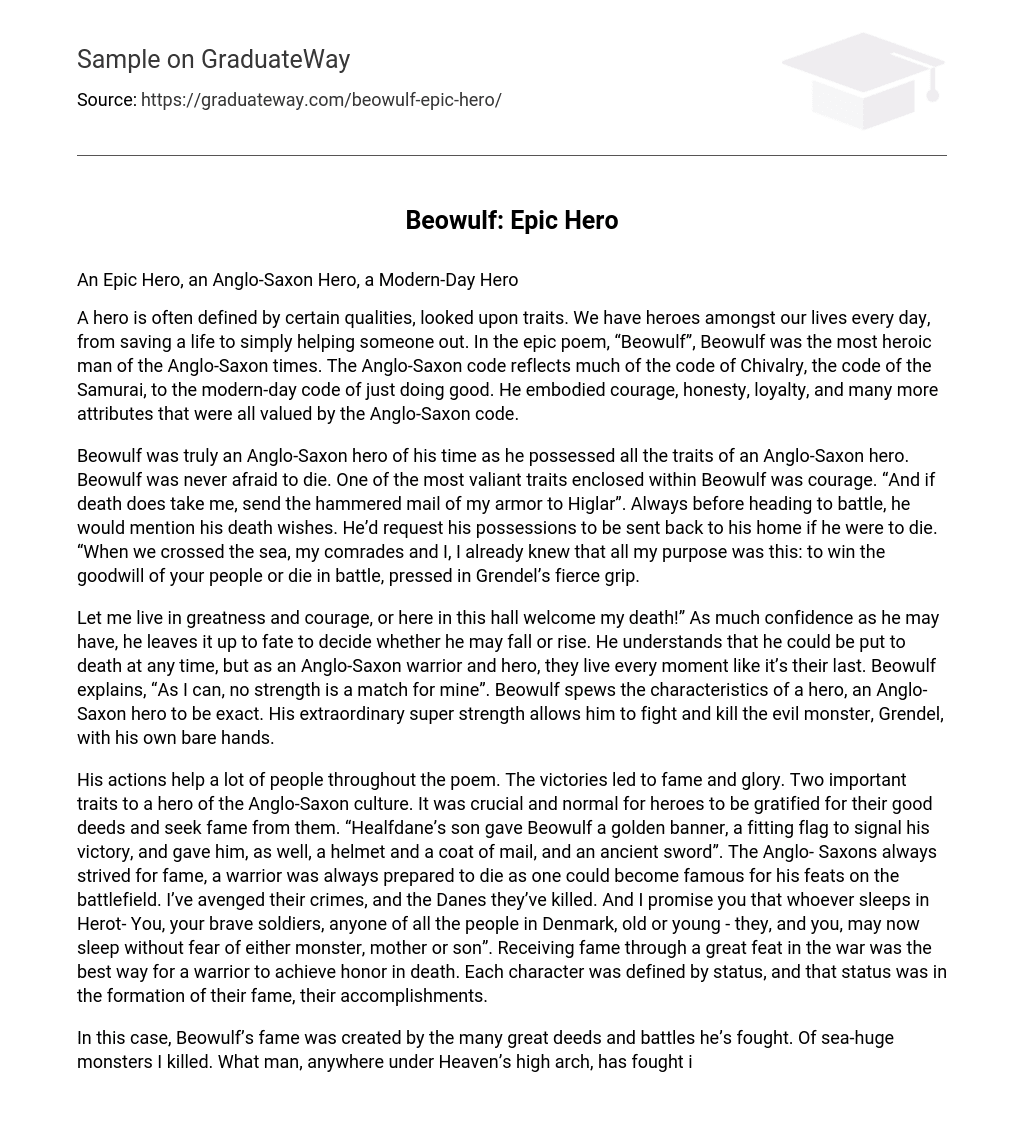An Epic Hero, an Anglo-Saxon Hero, a Modern-Day Hero
A hero is often defined by certain qualities, looked upon traits. We have heroes amongst our lives every day, from saving a life to simply helping someone out. In the epic poem, “Beowulf”, Beowulf was the most heroic man of the Anglo-Saxon times. The Anglo-Saxon code reflects much of the code of Chivalry, the code of the Samurai, to the modern-day code of just doing good. He embodied courage, honesty, loyalty, and many more attributes that were all valued by the Anglo-Saxon code.
Beowulf was truly an Anglo-Saxon hero of his time as he possessed all the traits of an Anglo-Saxon hero. Beowulf was never afraid to die. One of the most valiant traits enclosed within Beowulf was courage. “And if death does take me, send the hammered mail of my armor to Higlar”. Always before heading to battle, he would mention his death wishes. He’d request his possessions to be sent back to his home if he were to die. “When we crossed the sea, my comrades and I, I already knew that all my purpose was this: to win the goodwill of your people or die in battle, pressed in Grendel’s fierce grip.
Let me live in greatness and courage, or here in this hall welcome my death!” As much confidence as he may have, he leaves it up to fate to decide whether he may fall or rise. He understands that he could be put to death at any time, but as an Anglo-Saxon warrior and hero, they live every moment like it’s their last. Beowulf explains, “As I can, no strength is a match for mine”. Beowulf spews the characteristics of a hero, an Anglo-Saxon hero to be exact. His extraordinary super strength allows him to fight and kill the evil monster, Grendel, with his own bare hands.
His actions help a lot of people throughout the poem. The victories led to fame and glory. Two important traits to a hero of the Anglo-Saxon culture. It was crucial and normal for heroes to be gratified for their good deeds and seek fame from them. “Healfdane’s son gave Beowulf a golden banner, a fitting flag to signal his victory, and gave him, as well, a helmet and a coat of mail, and an ancient sword”. The Anglo- Saxons always strived for fame, a warrior was always prepared to die as one could become famous for his feats on the battlefield. I’ve avenged their crimes, and the Danes they’ve killed. And I promise you that whoever sleeps in Herot- You, your brave soldiers, anyone of all the people in Denmark, old or young – they, and you, may now sleep without fear of either monster, mother or son”. Receiving fame through a great feat in the war was the best way for a warrior to achieve honor in death. Each character was defined by status, and that status was in the formation of their fame, their accomplishments.
In this case, Beowulf’s fame was created by the many great deeds and battles he’s fought. Of sea-huge monsters I killed. What man, anywhere under Heaven’s high arch, has fought in such darkness, endured more misery or been harder?”. In the Anglo-Saxon culture, it was so important for the warriors to be proud of what they did and sought fame from them. Generosity was key, it was an aptitude that was essential to become a great ruler as well. Hrothgar, King of the Danes, was a great political leader that embodied generosity to the fullest. Hrothgar mentions that Beowulf manifested the qualities of a good leader, a king to be exact, a great protector of the Geats. One man found it, came to Denmark, and with the Lord’s help did what none of the Danes could do, our wisdom, our strength, worthless without him. Let me take you to my heart, make you my son too, and love you: preserve this passionate peace between us. And take, in return, whatever you may want from whatever I own”
Hrothgar spewed generosity and kindness to Beowulf in return for the death of the evil monster that has been lurking their corridors, he presented Beowulf with gold, finery, weapons, and armor, etc. “When Herdred had fallen that famous warrior went back to Sweden, let Beowulf rule!”. We find generosity on Beowulf’s part as he declined the throne from Hrothgar and allowed his son Hygelac to take it. By supporting the correct heir to the throne, Beowulf proves his worthiness of a king even more. “My purpose was this: to win the goodwill of your people or die in battle”. The overall purpose of Beowulf’s presence amongst the Danes was to free them from harm, which he did. Although he tried to obtain glory from it, it was all in goodness. Overall, whether it be an Epic hero or an Anglo-Saxon hero, a hero is someone who does things out of honor, bravery, and duty.
As depicted by the Germanic heroic code, Beowulf’s traits such as his strength and honor as a young warrior, were capable of even holding the throne, which he did much later after denying the first request by Hrothgar. Being through three separate major conflicts throughout his life, he establishes himself as a hero like none other, he remains the greatest throughout the ages. His greatness is spoken and retold even today. All in all, a hero perceives virtues to carryout informal achievements regardless of the outcome. Courage, honesty, loyalty, and much more, attributes that Beowulf encompassed to the fullest.





